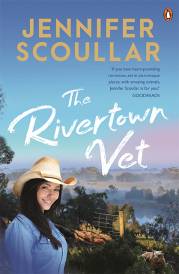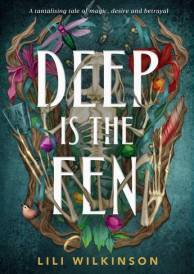Douglas Gresham The Voyage of the Dawn Treader DVD Interview
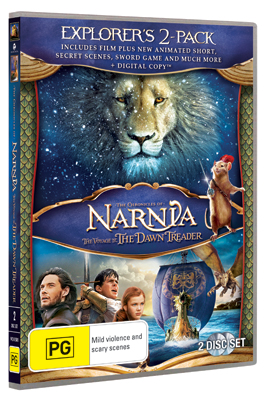
Douglas Gresham The Voyage of the Dawn Treader DVD Interview
Cast: Georgie Henley, Skandar Keynes, Ben Barnes
Director: Michael Apted
Genre: Fantasy-Adventure
Rated: PG
Running Time: 113 minutes
Return to the magic and wonder of C.S. Lewis' beloved world - via the magnificent ship, The Dawn Treader - in The Chronicles of Narnia: The Voyage of the Dawn Treader, as this fantasy-adventure sails onto high-definition Blu-ray and DVD from Twentieth Century Fox Home Entertainment.
The Voyage of the Dawn Treader marks the return to Narnia for courageous voyagers Edmund (Skander Keynes) and Lucy Pevensie (Georgie Henley). Joined, against his will, by their cousin Eustace (Will Poulter) this latest expedition follows the three adventurers as they are swallowed into a painting and transported to the magical world.
On their journey they connect with King Caspian (Ben Barnes) and a noble mouse named Reepicheep for a mission that will determine the fate of Narnia itself.
Special Features:
Through an extensive selection of special features led by King Caspian, kids and families will extend the journey and discover more of Narnia at home. Among the highlights to be explored on the Blu-ray voyage are: an interactive map showcasing more about this magical land and the seven secret islands; an all-new story extension - The Secret Islands: The Untold Adventures of the Dawn Treader; character discoveries; secret scenes; games and much more. The Explorers 2-Pack DVD includes the feature film plus an animated short tour of The Dawn Treader, secret scenes, sword game, digital copy and more.
The Chronicles Of Narnia: The Voyage of the Dawn Treader
RRP: $24.95
Blu-Ray: $32.95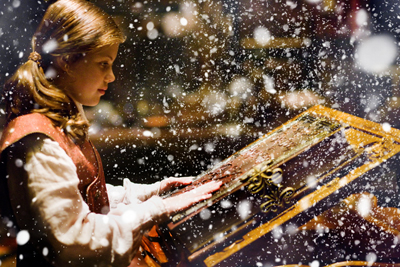
Interview with Douglas Gresham
Douglas Gresham, stepson of the legendary C.S. Lewis, author of The Chronicles Of Narnia, sits down for an insightful interview on the Australian set of The Chronicles of Narnia: The Voyage of the Dawn Treader, the third in the series of films based on the classic series.
Douglas Gresham gives his perspective on The Voyage of the Dawn Treader and what sets it apart, as well as recouting memories of his stepfather: one of the greatest fantasy novelists of all time.
The Chronicles of Narnia are justifiably known as the greatest time travel stories in the English language - and probably the first. They center of course on the Pevensie children who leave behind their normal lives in England and arrive in a magical world full of promise, danger and unimaginable adventure.
Fans of the enchanting C.S. Lewis book The Voyage of the Dawn Treader, the third in the series, will be familiar with the plot. Lucy Pevensie (Georgie Henley) and her brother Edmund (Skandar Keynes) are staying at the home of their unbearable and brattish cousin Eustace Clarence Scrubb (portrayed by talented newcomer Will Poulter). They are staring at a painting of a ship out at sea, which seems to be unnervingly realistic. Suddenly they are sucked right into the painting and emerge in stormy seas, where they are hoisted onto the deck of The Dawn Treader.
The Pevensie siblings are overjoyed to be reunited with their old friend King (formerly Prince) Caspian, played by Ben Barnes. They enthusiastically join him on his mission to find the seven Lost Lords of Narnia. Eustace is appalled and horrified to be in this strange unfamiliar world, but is forced reluctantly to tag along with his cousins. So begins an extraordinary adventure which takes them on a thrilling journey of discovery through different islands, to the ends of the world.
As they sail far beyond charted waters, the voyagers find themselves on a perilous quest that threatens their beloved Narnia and themselves.
On Australia's beautiful Gold Coast, there is a sense of wonder on the set. It feels like another world with sailors in billowing cream shirts and breeches roaming the cobbled streets of a medieval style village that has been beautifully created and constructed specially for the film - depicting The Lone Islands. Turn a corner and expect to encounter lifelike Minotaurs, fawns and satyrs.
The talented young stars of The Voyage of the Dawn Treader are on board the spectacular tall (140 feet long) 'dragon' ship which has been designed and built for the film.
On the lower deck of The Dawn Treader, eminent director Michael Apted is filming a key scene in the story. Will Poulter's Eustace is hungry and is attempting to steal an orange. He is caught in the act by the valiant talking mouse Reepicheep, Caspian's devoted servant. A chase ensues followed by a sword fight.
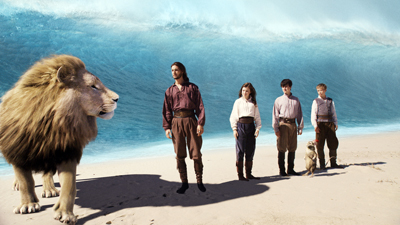 C.S. Lewis was born in 1898. Known as Jack, he was the close friend of another legendary fantasy writer: J.R.R. Tolkien, the author of the Lord of the Rings trilogy. The two men and other distinguished writers were members of The Inklings, an informal club that met at a local pub in Oxford (England) for literary discussions.
C.S. Lewis was born in 1898. Known as Jack, he was the close friend of another legendary fantasy writer: J.R.R. Tolkien, the author of the Lord of the Rings trilogy. The two men and other distinguished writers were members of The Inklings, an informal club that met at a local pub in Oxford (England) for literary discussions. Lewis was a formidable academic, theologian and scholar. His works include the 'Space Trilogy' and 'The Screwtape Letters'. But he became world famous to children as well as adults because of his children's fiction. His lifelong fascination with fairy tales, myths and ancient legends led him to write The Lion, The Witch and The Wardrobe (published in 1950). A total of seven books make up 'The Chronicles Of Narnia'.
Douglas Gresham is one of two stepsons of the legendary author who married his American mother Joy Davidman. Douglas Gresham is an executive producer on the film. On set in Australia he is observing the action, delighted that the third in the series of the Narnia classics is taking shape. He sits down outside the sound stage in the glorious Australian sunshine to talk about the film and his own personal, treasured memories of the man whose work has in many ways become the focus of his life.
Question: How close is this film and Narnia to your heart?
Douglas Gresham: I probably know more about Narnia than any other living human being. I certainly know more about Jack (C.S.Lewis) than anybody still alive. It was my project to get these movies made at some stage in my life and I have very much been enjoying the process. It took a long, long time to get them to happen and I oversee practically every thing to do with Narnia. I am the creative and artistic director of the C.S. Lewis Company, which is my day job. Making movies is a hobby on the side, although the movie-making in some ways has become bigger than the day job. I look at everything and check through and discuss almost every facet of the film.
Douglas Gresham: I try my very hardest to make that happen. It isn't always possible. Sometimes there are very good reasons why things have to change in terms of storylines, but the absolutely essential messages and meanings of the books I am adamant about retaining.
Question: Did you actually read the books with your stepfather as a child?
Douglas Gresham: Yes, the first one was 'The Lion, The Witch and The Wardrobe' and I was about 6 at the time. That would have made it about 1951. It was read to me first by my mother. But Jack (C.S.Lewis) would read me bits of what he was writing. That was an interesting experience. Some bits I loved and some I didn't like at all! I would tell him my thoughts and we used to laugh about it.
Question: The story and the film The Voyage of the Dawn Treader is fabulously entertaining isn't it?
Douglas Gresham: The footage looks superb. It's going to be a very beautiful movie; it's a very entertaining film. We actually had a cast and crew viewing of a 35 minute clip and it looks fabulous - absolutely phenomenal. We do have masters of the art of cinema on this film. We have Michael Apted who is a superb director and of course we've got Dante Spinotti as director of photography who is a genius - completely brilliant, so with the two of them together we should have some real fireworks. It is very exciting.
Question: The Narnia books are amazing stories - children everywhere read them wishing there really was a world at the end of the wardrobe.
Douglas Gresham: What makes you think there isn't?
Question: You knew this writer so well, what made his novels such classics that still resonate and are widely read the world over?
Douglas Gresham: A genius of that caliber only comes along once every couple of hundred years and we will be waiting a long time for the next one. Jack (C.S.Lewis) was a man who was incredibly widely read. He had studied the great mythologies of man from all over the planet. He read the great classics of literature, most of them in their own languages, by the time he was 26. He took four first class honors degrees from Oxford University in a period of three years! The man's mind was amazing. His talent was superb; his words and usage have never been surpassed. Therefore, when he wrote something designed and aimed at children it was bound to be something fairly special and the books are absolute classics. Nothing has been written since for children that even comes near them except perhaps 'The Hobbit' which almost makes it. Doesn't quite. Then 'The Lord of the Rings' is a fabulous piece of grown-up literature.
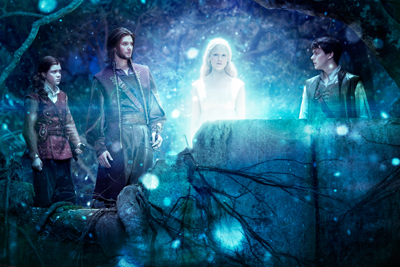 Question: J.R.R. Tolkien and C.S. Lewis were friends, weren't they?
Question: J.R.R. Tolkien and C.S. Lewis were friends, weren't they?Question: Apart from being a revered and distinguished academic, C.S. Lewis was obviously extraordinary at communicating with children, wasn't he?
Douglas Gresham: Yes there is a sort of urban myth that Jack (C.S.Lewis) didn't know any children. That actually comes from Shadowlands (play and film directed by Richard Attenborough with Anthony Hopkins as C.S. Lewis) but the truth of the matter is that Jack (C.S.Lewis) was surrounded by children for most of his life, obviously through his school life with his peers and later on at university with young people, particularly undergraduates. Then his 'adoption' of Mrs. Moore and her daughter Maureen Moore when he was 20 something years old resulted in his raising the child almost as his own daughter until she married and moved away in 1945. Her friends were always around, as well as my brother, myself and our friends, and so on. So it is complete folly to think that Jack (C.S.Lewis) did not know any children. But apart from that, he never forgot what it meant to be a child.
Question: What do you think made the Narnia books the perfect type of fantasy novel for children in the 50s and 60s, as well as turning into literature that has withstood the test of time?
Douglas Gresham: One of the reasons he wrote the Narnia Chronicles was that he felt that no one of his era was writing the sort of children's literature that he would have wanted to read when he was a child. When I was a child growing up, I was reading John Buchan and Charles Dickens and Jules Verne and all those great classic authors of young people's literature. The stuff that was being produced at the time (of Narnia) held no interest and I can't remember a single title. There were some exceptions. Roger Lancelyn Green [former student of CS Lewis, an Oxford academic who formed part of The Inklings discussion group along with CS Lewis and J.R.R. Tolkien] wrote some very good children's literature, E. Nesbit of course was a great children's author (also fantasy). Her books include 'Five Children and It' and 'The Railway Children'. But nobody at that time in the late 1940s and 1950s was writing stuff like the Narnia books that really would appeal to children.
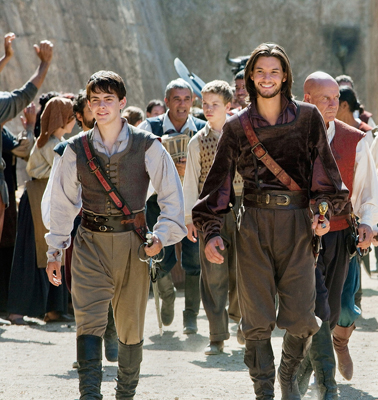 Question: What would C.S. Lewis make of this film do you think?
Question: What would C.S. Lewis make of this film do you think?Douglas Gresham: I think he would be thrilled with the imagery."
Question: What was your stepfather's view on cinema and films?
Douglas Gresham: He was worried about films. Jack (C.S.Lewis) was prescient in many ways; he was very prophetic. He saw this wonderful technology emerging and was greatly afraid of the uses to which it could be put. That fear was borne out by Hitler's propaganda movies. One of Jack's (C.S.Lewis) biggest problems with Narnia in relation to films is that he felt it was almost impossible to do justice to the character of Aslan with the technology that existed back then. And I think he was right. With the animation they had early on, you could not do justice to Aslan. However I think if Jack had seen what we did with Aslan in The Lion, The Witch and the Wardrobe, Prince Caspian and this movie, he would be absolutely thrilled with the majesty and dignity of the character. I'd like to put far more of Aslan in our movies, the problem is that it is very, very expensive to completely create a computer generated image from nothing and then make it talk and do stuff.
Question: How does this film differ and stand out from the previous ones in terms of theme?
Douglas Gresham: The whole theme of this particular book is temptation and how to deal with it, which is something of course that we need to know very strongly in today's world. The book is very good at depicting that. From the footage I have seen it is also depicted very well in the movie.
Question: Do you think there is an uplifting dimension to this movie and to the Narnia movies and books in general?
Douglas Gresham: I believe very strongly that is true. I am fully aware that there is a spiritual dimension to everything in C.S. Lewis's work. The fact of the matter is that during the 20th century we seemed to throw away, I suppose on the grounds that they were out of date or something, all the great concepts of the 19th century: things like personal forgiveness, taking responsibility for your own actions, courage, beauty, honor, chivalry-all of those wonderful things that bonded civilisation together. We need to get all of these things back and one of the great things about the Narnia Chronicles is that they show us how.
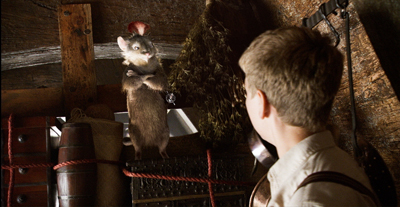 Question: Why have you made your stepfather such a huge part of your life?
Question: Why have you made your stepfather such a huge part of your life?Douglas Gresham: I think I inherited a moral responsibility to take care of his works the best I can. I've done many other things as well, I have been a farmer for many years, and I ran a psychotherapy and counseling ministry in Ireland for 13 years. But this actually has become the main theme in my life relatively late in life. I didn't start out this way. I like the work and I love the books and films.
Question: Do you think they will remain relevant and fascinating as time goes on?
Douglas Gresham: I firmly believe that these books will stand on a high pedestal in literature and will always be read and loved. I think if mankind goes on for another fifty thousand years, people will still be reading the Narnian Chronicles. These books are immortal classics.
Interview by Elaine Lipworth
MORE



